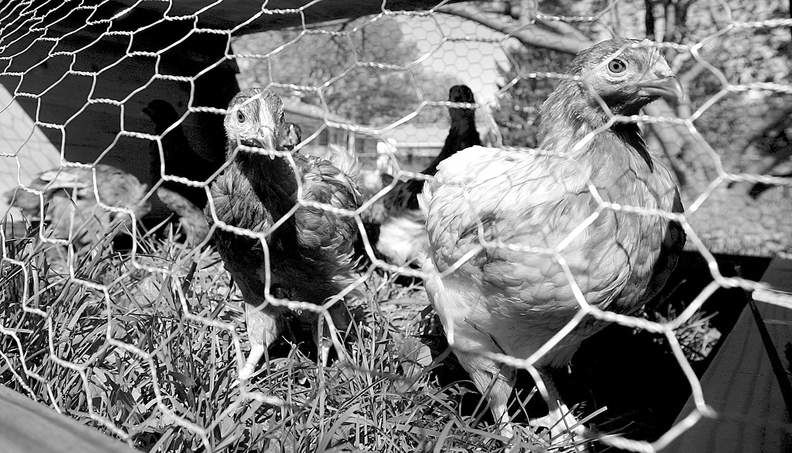Urban chicken movement takes roost in backyards
Published 5:00 am Sunday, May 17, 2009

- Dave Crupper, of Overland Park, Kan., has petitioned the city for a special-use permit to raise his four chickens already occupying a coop in his backyard.
KANSAS CITY, Mo. — Chickens could be coming to roost in a backyard near you.
Across the country, people are joining the national urban chicken movement, sometimes turning outlaw to raise the birds.
The movement started with the rationale that raising chickens fits in with efforts toward local and pure foods, supporters say, and the eggs are fresh and flavorful. The animals also are entertaining pets, many say.
Overland Park, Kan., homeowner David Crupper is seeking a special-use permit to house up to four chickens, even though he already has the birds and a homemade coop in his backyard.
No disrespect for the law was intended, he said, but he had to buy the chicks before a farm supply business stopped selling them for the year. Crupper, 25, a financial adviser, is far from a hippie, he said, but he wants to get great eggs from “the girls.”
“It’s a nice little hobby people can get behind,” he said, and he thinks his neighbors will support him.
Crupper has mailed certified letters to all of the neighbors within 200 feet and has posted a sign in his front yard advising them of the Planning Commission meeting.
But precedent isn’t on Crupper’s side. Four years ago, another Overland Park family tried to get such a permit. By a vote of 7-5, the City Council wouldn’t allow it.
Opponents said then that chickens did not belong in Overland Park. Some said the birds were unsanitary.
Overland Park City Councilman Jim Hix, who voted against the chickens in 2005, said this week that he would probably do so again.
“Wanting eggs is not unique,” he said. “It’s not a good idea to have chickens in a suburban area under normal circumstances.”
In Mission, Kan., the City Council recently sent to committee a proposal to change its law to allow urban chickens. Jerritt Dayhoff requested the change because her family would like to raise five or six chickens. She is a former public defender who grew up on a farm, she said.
“Chickens are a heck of a lot quieter and cleaner than dogs,” said Dayhoff, 33. They make interesting pets, she said, and “It’s nice to tell your kids your breakfast came from Myrtle or Madge.”
But Councilman John Weber, 77, said he has seen the city grow out of farmland and sees no reason to go back.
“If we’re going to be residential, we ought to be residential,” he said.
Some cities on board
In 2004, Madison, Wis., was among the first of several cities to change laws to allow limited numbers of chickens, but usually not crowing roosters. New York City has long allowed chickens. The birds live in urban areas in Chicago, Albuquerque, N.M., Portland, Seattle and other cities.
Many Web sites and Backyard Poultry magazine support the effort, which they say is still growing in this country, Great Britain and Canada.
BackYardChickens.com has 30,000 members — up from 20,000 last December — and it grows by 100 members a day, said its owner, Rob Ludlow.
KT LaBadie, an Albuquerque graduate student who started urbanchickens.org, said people are tearing out lawns to grow vegetables, and chickens are a natural next step.
Some cities have changed their laws because so many people were keeping chickens illegally, she said.
Afoul of the law
In Kansas City, Mo., residents are allowed to have chickens only if they are 100 feet away from the nearest home or business, and the birds are not allowed to roam.
That hasn’t stopped two women in different Kansas City neighborhoods from raising chickens illegally, and they say they are doing it for the fresh eggs.
At one house, nine big chickens roam in a fenced backyard where a wooden chicken coop looks like a garden shed. The 28-year-old homeowner has given names to all nine of her chickens, and she has pictures of herself with each on her MySpace page. The hens produce about six or seven eggs a day, and she sells or trades any extra eggs to pay for feed.
In another Kansas City neighborhood, a 49-year-old woman raises just one chicken.
The hen, called simply Chicken, spends time in the garden this time of year, scratching up the soil and fertilizing it with its droppings. In winter, it lives in a coop in the basement. Chicken lays about five eggs a week.
Light enforcement
Both of the Kansas City women said their neighbors haven’t complained, and some are checking into getting chickens themselves.
So does that mean more chickens and lawbreaking are on the way?
Dave Marak, a supervisor with Kansas City animal control, said a crew recently took five illegal chickens to the animal shelter, something it does occasionally.
Few people retrieve chickens there because of a $25 pickup fee and $10 a day in expenses, he said, plus chicken owners could get fined.
The fine is up to $250, but judges generally don’t impose anywhere near that, and cases sometimes get dismissed, he said.
Animal control generally goes after chickens only when someone complains, he said.
“Usually if a complaint comes in, it’s because they’re letting them run loose or a new neighbor comes in,” he said.
Marak takes no position on the controversy other than to note that strong forces are in play.
“There’s nothing better than a fresh egg,” he said.






